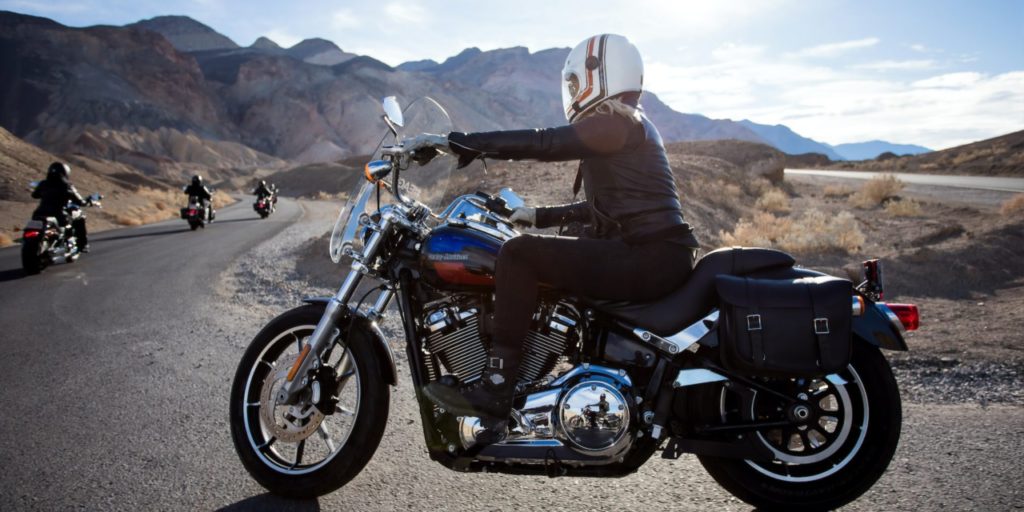- Optional coverage is the wrong way to cut insurance rates - April 22, 2024
- A primer on successfully claiming LTD benefits in Ontario - March 18, 2024
- Clear your sidewalks after a snowfall or you could face liability - February 7, 2024
By Paul Russell, LegalMatters Staff • Before they hit the road, motorcyclists across Ontario should ensure they are wearing proper safety gear to reduce their injuries in case of an accident, says Toronto personal injury lawyer Joshua Goldberg.
“While many people find great pleasure in riding, they always have to keep in mind that motorcycles are the smallest vehicles on the road,” says Goldberg, principal of Joshua Goldberg Law. “Because they offer significantly less protection than cars in case of an accident, riders are doing themselves a favour by having proper gear.”
According to a Transport Canada report, 242 motorcyclists died in 2020, representing 13.9 per cent of overall fatalities on the road.
A good helmet is essential
Goldberg tells LegalMattersCanada.ca that a proper helmet is the most important piece of safety gear, noting that studies have found thatthey reduce the risk of head injury by 69 per cent and the risk of death by 43 per cent.
“In Ontario, as in the rest of Canada, you cannot ride a motorcycle without a helmet. If you do, you are not only risking serious injuries but you are facing costly fines,” he says.
Goldberg says the best choice is a full-face helmet that covers the entire head, face and chin. Regardless of whether you opt for a full or open-face style, he notes that Regulation 610 of the Highway Traffic Act requires that all motorcycle helmets conform to DOT (American) or ECE (European) standards. Helmets that meet these certifications will be marked with a sticker on the back.
“If you suffered injuries in a motorcycle accident and you were not wearing a proper helmet, your insurance company could refuse your claim,” Goldberg says. “In addition, your lack of proper headgear could be a real obstacle if you decide to sue for pain and suffering caused by the accident.”
Face shields make riding more comfortable
As well as protecting the skull in case of an accident, he notes that helmets with face shields protect the motorcyclist’s face from road debris, dust and insects.
“Helmets make riding in inclement weather safer and more comfortable,” Goldberg says. “Even on sunny days, a proper face shield will keep the sun out of your eyes, allowing you to pay better attention to any road hazards up ahead.”
- Ontario NDP should not look to B.C. for auto insurance reform
- Workplace injuries can happen in the home office
- LTD claims sure to rise for teachers, police after COVID
Thanks to advances in technology, he says today’s helmets offer features such as anti-fog visors, slide-down sun visors, removable linings for washing and anti-bacterial fabrics.
One exemption to helmet law
Goldberg notes that in 2018, Ontario’s Bill 41 exempted people from wearing helmets who:
- are members of the Sikh religion;
- have unshorn hair; and
- habitually wear a turban composed of five or more square metres of cloth.
As a Sikh MPP noted at that time, “The wearing of the turban is an essential part of the Sikh faith and identity, and exemptions for Sikhs have been successfully implemented in other provinces in Canada and across the world.”
Wear protective clothing
Goldberg urges motorcyclists to wear jackets and pants that cover their legs and arms, even in warm weather. He notes that while leather offers the best protection in a fall, synthetic materials can offer a significant amount of protection
“It is also a good idea to wear bright colours or reflective items to make you more visible to other drivers on the road,” he says.
Though leather jackets are the choice of traditional motorcycle enthusiasts, he notes that man-made textile jackets are very popular, since they can offer the same abrasion resistance as leather while being lighter and more comfortable.
“Depending on what jacket you buy, it can have multiple, removable layers, offering different levels of ventilation and thermal,” adds Goldberg. “In addition, some of these jackets have ‘armour’ on the elbows, shoulders, and back to protect against impact.”
Leave your sandals at home
Proper footwear is also essential, he says.
“Avoid sandals or loose-fitting shoes when riding,” Goldberg says. “You want boots or shoes that are enough to protect your ankles, with soles that will grip the pavement when you are stopped.”
Gloves are also a good idea no matter the weather, he says.
“Gloves give you a better hold on the hand grips,” Goldberg says. “Gloves that extend over your wrists are recommended because they protect your wrists, as well as your fingers and knuckles.”
He advises anyone who has been injured in a motorcycle accident to contact his office for advice on how to receive adequate compensation.

